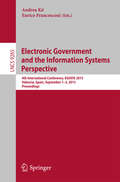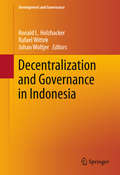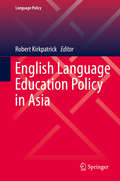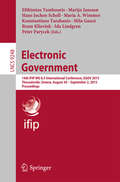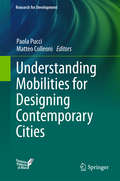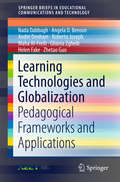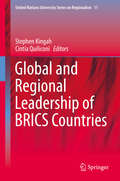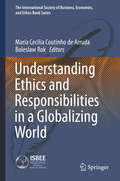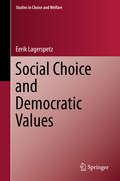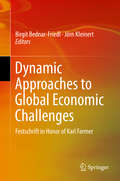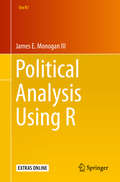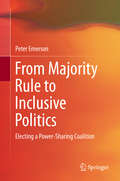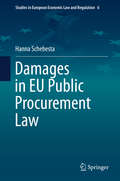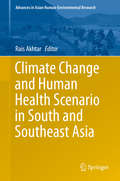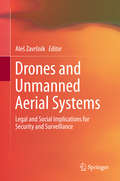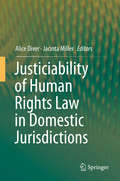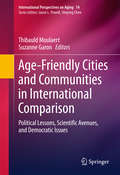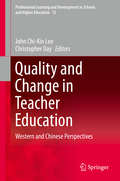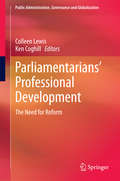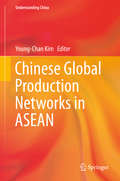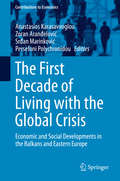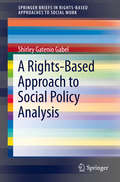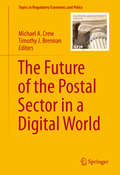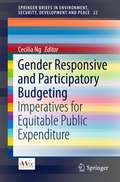- Table View
- List View
Electronic Government and the Information Systems Perspective
by Enrico Francesconi Andrea KőIn front of you are the proceedings of the First International Conference on Electronic Government and Information Systems Perspective, EGOVIS. This conference builts on the tradition of its predecessors, the Electronic Government Conferences (EGOV) under the DEXA umbrella, which have been ongoing for nine years, but it also - cluded some innovations. In view of the large number of electronic government c- ferences, we found it important to focus the scope of the conference a little and to increase the quality requirements. Hence this year's conference featured a tougher review process and a smaller set of accepted papers. As a result, these proceedings contain the very best papers of 2010 covering various important aspects of electronic government and information systems used in the public sector. With an acceptance rate of less than 20% EGOVIS belongs to the top ten conferences in the world. The Program Committee accepted 13 full papers and 11 short papers, covering the most recent research trends in electronic government implementations, such as ICT for eGovernment services and monitoring, knowledge and content management systems for temporal and geo-spatial applications, interoperability for electronic government integrated architectures, decision and support tools for eDemocracy and direct parti- pation of citizens in the policy-making strategies, and Web 2. 0 and 3. 0 approaches for collaborative and transparent public sector services.
Decentralization and Governance in Indonesia
by Rafael Wittek Ronald L. Holzhacker Johan WoltjerIndonesia over the past two decades has embarked on a process of decentralization as part of a broader process of democratization, which followed earlier periods of centralized governance and authoritarian rule across the archipelago. The purpose of this book is to begin to explore the connections between governance and sustainable society in a wide variety of policy fields in Indonesia, and how reforming governance structures may contribute to societal benefits and the creation of a long-term sustainable society. This book bridges important theoretical debates related to governance and sustainable society and provides empirical research from Indonesia in important policy areas related to this debate. By placing research in different policy areas in a single volume, the link to the broader concepts of governance, decentralization, and societal outcomes is strengthened. The book builds on the recent interest that has focused on Indonesia and the continued development of democracy in the country. The chapters in the book show a rich variety of decentralized governance arrangements and capacity building at the local level in particular. Central standards (for example for social sustainability, anti-corruption arrangements, or for dealing with direct foreign investment), combined with local innovation (for example for municipal coordination of primary health care or metropolitan transport), are key to Indonesia as a country in a continuing process of transformation. We identify three key trends in the on-going process of decentralization and governance in Indonesia. First, we find that formal governance, the relation between the national and local government, is characterized by a system of ''variable geometry multi-level governance'' depending on the policy area. The challenge ahead is strengthening accountability mechanisms to assure national standards while preserving and encouraging local innovation. Secondly, informal governance mechanisms are evolving to move from ''hierarchical to network'' forms of governance. Here the challenge is to insure democratic input by citizens and civil society organizations. Finally, we identify a trend toward ''shared value creation and sustainable cooperation. '' Indonesia is beginning to move from a rather singular policy focus on economic growth to a more complex and developing notion of policymaking for inclusive growth and the creation of a sustainable society for present and future generations. Here the challenge is sound implementation and to increase the effectiveness of governance mechanisms. There is also a noted diffusion of goals, to focus beyond the Jakarta metropolitan area to smaller regional cities, as urbanization continues and rural areas are changing. This book will be of interest for use in advanced undergraduate and graduate courses related to Southeast Asia in the fields of international relations, political science, public administration, economics, law, sociology, educa tion, public health, and the spatial sciences. It will also be of interest to policymakers and government officials at the national and local level in Southeast Asia and middle-income developing countries, officials and policymakers in institutions of regional governance such as the Association of Southeast Asian Nations (ASEAN), and of global governance such as the United Nations and World Bank. It will also be of interest to civil society organizations and other actors focused on policy development and economic development, health, education, the environment, sustainable transport, etc. The book will also be of interest to business people interested in economic and governance issues, such as the management and governance of in-bound foreign investment, inclusive growth, and corporate governance. Finally, the book should be of interest to citizens in advanced, middle-income, and developing countries motivated to learn more about the links between governance and the creation of a sustainable society for current and future generations.
English Language Education Policy in Asia
by Robert KirkpatrickThis volume offers comprehensive 'state-of-the-art' overviews of educational policies concerning the teaching of English in a large number of Asian countries. Each contribution is written by a leading expert and gives a clear assessment of current policies and future trends. Starting with a description of the English education policies in the respective countries, the contributors then delve into the 'nuts and bolts' of the English education policies and how they play out in practice in the education system, in schools, in the curriculum, and in teaching. Topics covered include the balance between the acquisition of English and the national language, political, cultural, economic and technical factors that strengthen or weaken the learning of English.
Electronic Government
by Konstantinos Tarabanis Efthimios Tambouris Maria A. Wimmer Hans Jochen Scholl Marijn Janssen Mila Gascó Bram Klievink Ida Lindgren Peter ParycekThis book constitutes the refereed proceedings of the 14th IFIP WG 8. 5 International Conference on Electronic Government, EGOV 2015, held in Thessaloniki, Greece, in August/September 2015 in conjunction with the 7th International Conference on eParticipation, ePart 2015. The 25 revised full papers presented were carefully reviewed and selected from 53 submissions. The papers have been organized in the following topical sections: foundations; open and smart government; services, processes and infrastructure; and application areas and evaluation.
Understanding Mobilities for Designing Contemporary Cities
by Paola Pucci Matteo ColleoniThis book explores mobilities as a key to understanding the practices that both frame and generate contemporary everyday life in the urban context. At the same time, it investigates the challenges arising from the interpretation of mobility as a socio-spatial phenomenon both in the social sciences and in urban studies. Leading sociologists, economists, urban planners and architects address the ways in which spatial mobilities contribute to producing diversified uses of the city and describe forms and rhythms of different life practices, including unexpected uses and conflicts. The individual sections of the book focus on the role of mobility in transforming contemporary cities; the consequences of interpreting mobility as a socio-spatial phenomenon for urban projects and policies; the conflicts and inequalities generated by the co-presence of different populations due to mobility and by the interests gathered around major mobility projects; and the use of new data and mapping of mobilities to enhance comprehension of cities. The theoretical discussion is complemented by references to practical experiences, helping readers gain a broader understanding of mobilities inrelation to the capacity to analyze, plan and design contemporary cities.
Learning Technologies and Globalization
by Nada Dabbagh Angela D. Benson André Denham Roberto Joseph Maha Al-Freih Ghania Zgheib Helen Fake Zhetao GuoThis brief describes the evolutionary and global impact of the techno-social transformation on learning technologies in terms of emerging pedagogical frameworks and applications. it provides examples of such applications in higher education, K-12, and the workplace, across the globe. The transformation and diffusion of ICT into an ever-present and accessible phenomenon is fundamentally shaping human activity and culture, changing human identity, and redefining globalization. Global activities have widened, intensified, and accelerated as a result of ICT integration generating a new awareness of the world as a techno-social environment. This emergent global environment is introducing unprecedented socio-economic opportunities; however, it is also bringing new risks and challenges, particularly as this relates to learning technologies, most especially in higher education contexts.
Global and Regional Leadership of BRICS Countries
by Stephen Kingah Cintia QuiliconiThis book presents a systematic collation of the regional and global dimensions of the leadership role of BRICS countries (Brazil, Russia, India, China and South Africa). It analyses the rising regional and global leadership of BRICS, using specific benchmarks to gauge the nature of this leadership. The elements examined include willingness to lead, the capacity to do as much, and the degree to which the given actor is accepted as a leader both within and beyond its region. The chapters in the book capture the nature of trends in regional and global leadership within the contexts of a changing international order. It is taken for granted that Brazil, Russia, India, China and South Africa are now engineering a unique pool of governance that is seeking alternatives to the current order of global economic and political affairs. The fact that these countries have jointly decided to forge ahead with the BRICS constellation of states that is now taking consequential decisions such as the creation of the BRICS' New Development Bank, is not to be treated lightly. In this book the majority of papers take a step back and systematically analyse the real state of the leadership that is provided by the BRICS on a litany of regionally and globally relevant issues. While no one doubts the fact that these countries have the capacity to provide leadership especially in their various regions on many issues, what remains moot is whether they are willing and capable to do so at the global level. Even in those cases where there is the willingness and capacity, the book argues that the acceptance of such leadership by potential followers is not always a given.
Understanding Ethics and Responsibilities in a Globalizing World
by Maria Cecilia Coutinho de Arruda Boleslaw RokThis book contemplates the ethics of responsibility in a large range of meanings, consequences and impacts. It reflects the perspectives and reasoning of 24 authors from all continents. All chapters are original papers presented at the Fifth World ISBEE Congress, that took place in Warsaw, Poland, at the Kozminski University, on 11-14 of July, 2012. In this book, ethics and responsibility are considered essential traits of character, not only in the business or governmental arenas but in any initiative, decision and activity. The contributions to this book focus on a spectrum of themes, terms and concepts, the global corporate social responsibilities perspective covering impacts, challenges, analysis, criticism, consequences of important topics of real life, sustainability, international economy and regimes, corruption, poverty and violence, among others. The book is intended for academics, researchers and professionals in all continents who are dedicated to Ethics, Business Ethics, Corporate Social Responsibility, Social Innovation, and Sustainability Management.
Social Choice and Democratic Values
by Eerik LagerspetzThis book offers a comprehensive overview and critique of the most important political and philosophical interpretations of the basic results of social choice, assessing their plausibility and seeking to identify the links between the theory of social choice and the more traditional issues of political theory and philosophy. In this regard, the author eschews a strong methodological commitment or technical formalism; the approach is instead based on the presentation of political facts and illustrated via numerous real-life examples. This allows the reader to get acquainted with the philosophical and political dispute surrounding voting and collective decision-making and its links to social choice theory.
Dynamic Approaches to Global Economic Challenges
by Birgit Bednar-Friedl Jörn KleinertThis book addresses three big economic challenges from a dynamic perspective: European integration, economic growth, and global climate change. In the light of the recent crises of the European Union (EU), the first part of the book deals with challenges to the real, monetary and fiscal integration of the EU and required institutional adjustments. The second part of the book addresses fundamental challenges of advanced market economies like economic growth and changes of technologies. The final part focuses on the global challenge of climate change from an economic perspective and discusses policy strategies for a successful mitigation of climate change.
Political Analysis Using R
by James E. MonoganThis book provides a narrative of how R can be useful in the analysis of public administration, public policy, and political science data specifically, in addition to the social sciences more broadly. It can serve as a textbook and reference manual for students and independent researchers who wish to use R for the first time or broaden their skill set with the program. While the book uses data drawn from political science, public administration, and policy analyses, it is written so that students and researchers in other fields should find it accessible and useful as well. By the end of the first seven chapters, an entry-level user should be well acquainted with how to use R as a traditional econometric software program. The remaining four chapters will begin to introduce the user to advanced techniques that R offers but many other programs do not make available such as how to use contributed libraries or write programs in R. The book details how to perform nearly every task routinely associated with statistical modeling: descriptive statistics, basic inferences, estimating common models, and conducting regression diagnostics. For the intermediate or advanced reader, the book aims to open up the wide array of sophisticated methods options that R makes freely available. It illustrates how user-created libraries can be installed and used in real data analysis, focusing on a handful of libraries that have been particularly prominent in political science. The last two chapters illustrate how the user can conduct linear algebra in R and create simple programs. A key point in these chapters will be that such actions are substantially easier in R than in many other programs, so advanced techniques are more accessible in R, which will appeal to scholars and policy researchers who already conduct extensive data analysis. Additionally, the book should draw the attention of students and teachers of quantitative methods in the political disciplines.
From Majority Rule to Inclusive Politics
by Peter EmersonThis book discusses voting procedures in collective decision-making. Drawing on well-established election processes from all over the world, the author presents a voting procedure that allows for the speedy but fair election of a proportional, all-party coalition. The methodology - a matrix vote - is accurate, robust and ethno-color blind. In the vote, the counting procedure encourages all concerned to cross the gender as well as any party and/or sectarian divides. While in the resulting executive each party will be represented fairly and, at best, with the consensus of parliament, every minister will be the one most suited to his/her new portfolio. By using preferential voting and thus achieving consensus, the matrix vote will be fundamental to the resolution of conflicts. The matrix vote can also be used when: * two or more parliamentary parties elect a coalition government * one parliamentary party elects a government or shadow cabinet, or organizations in civil society elect their governing boards or executive committees * any group chooses a fixed number of individuals to form a team in which each member carries out a different function
Damages in EU Public Procurement Law (Studies in European Economic Law and Regulation #6)
by Hanna SchebestaThe book surveys the enforcement of EU law through the lens of damages claims for violations of EU public procurement rules. The first part clarifies the requirements on damages claims under both public procurement and general EU law, notably the public procurement remedies directives and doctrines such as procedural autonomy, effective judicial protection and Member State liability. The second part focuses on comparative law, covering England, France, Germany and the Netherlands, and provides an overview of national regulation and case law of damages litigation in the area of public procurement. A third part discusses the constitutive and quantification criteria of the damages remedy from a comparative and EU law perspective. It explores the lost chance, which functionally emerges as a compromise capable of mitigating the typically problematic nature of causation and uncertainty in public procurement constellations. The book concludes with a proposal for legislative intervention regarding damages in public procurement.
Climate Change and Human Health Scenario in South and Southeast Asia (Advances in Asian Human-Environmental Research)
by Rais AkhtarThis book is the first to present a regional analysis of climate change and human health, focusing on geographically and socio-economically distinct countries of South and Southeast Asia. It has a major focus on India, Indonesia, Bangladesh, Malaysia, Thailand, Nepal and Taiwan. Climate change is a significant and emerging threat to human health. lt represents a range of environmental hazards and will affect populations in both the developed and developing countries. In particular, it affects the regions where the current burden of climate-sensitive diseases are high, which is the case in South and Southeast Asian countries.
Drones and Unmanned Aerial Systems
by Aleš ZavršnikThis book tackles the regulatory issues of Unmanned Aerial Systems (UAS) or Remotely-Piloted Aerial Systems (RPAS), which have profound consequences for privacy, security and other fundamental liberties. Collectively known as "drones," they were initially deployed for military purposes: reconnaissance, surveillance and extrajudicial executions. Today, we are witnessing a growth of their use into the civilian and humanitarian domain. They are increasingly used for goals as diverse as news gathering, aerial inspection of oil refinery flare stacks, mapping of the Amazonian rain-forest, crop spraying and search and rescue operations. The civil use of drones is becoming a reality in the European Union and in the US. The drone revolution may be a new technological revolution. Proliferation of the next generation of "recreational" drones show how drones will be sold as any other consumer item. The cultural perception of the technology is shifting, as drones are increasingly being used for humanitarian activities, on one hand, but they can also firmly be situated in the prevailing modes of postmodern governance on the other hand. This work will be of interest to researchers in Criminology and Criminal Justice interested in issues related to surveillance, security, privacy, and technology. It will also provide a criminological background for related legal issues, such as privacy law, aviation law, international criminal law, and comparative law.
Justiciability of Human Rights Law in Domestic Jurisdictions
by Alice Diver Jacinta MillerThis collection of 16 essays by 19 contributors calls into question the notion of domestic justiciability across a wide range of human rights issues, such as health, human dignity, criminal justice, property and transitional democracy. The authors offer critical analyses of a number of rights frameworks, focusing in considerable detail upon specific countries (e. g. Libya, Colombia, Ireland, the United Kingdom, Northern Ireland, South Africa, Nigeria, Zimbabwe, Kenya, India) and regions (e. g. Europe, Africa) to highlight the various challenges which continue to vex human rights advocates and scholars. In doing so they pinpoint some of the major tensions that still exist within developing and developed jurisdictions, via a myriad range of perspectives. The essays collectively present a diverse assortment of themes unified by a single 'golden thread' - that of the domestic interpretations given to human rights protections. They raise questions as to how such rights might be made substantive at the level of domestic implementation, and query the extent to which these rights can, or even should, be enforced by the courts. The potential strains in the relationship between human rights and the rule of law, is further called into question by another central theme: that of human dignity. A fundamental dilemma arises in respect of the extent to which a 'right' to dignity can best be promoted, protected or monitored by domestic decision-makers. Similar issues are apparent within the context of the protection of those human rights which increasingly tend to engage social, political or economic considerations and interests. Whilst these arguments are often framed principally in terms of 'rights,' the collective message that emerges from this book is that such rights may often be, in fact, essentially non-justiciable. Readers of this text will perhaps feel compelled to reflect carefully and fully upon what it tells us about human rights law generally, and the extent to which such rights may be truly amenable to adjudication by the courts.
Age-Friendly Cities and Communities in International Comparison: Political Lessons, Scientific Avenues, and Democratic Issues (International Perspectives on Aging)
by Thibauld Moulaert Suzanne GaronThe supportiverole of urban spaces in active aging is explored on a world scale in thisunique resource, using the WHO's Age-Friendly Cities and Community model. Casestudies from the U. S. , Canada, Australia, Hong Kong, and elsewhere demonstratehow the model translates to fit diverse social, political, and economic realitiesacross cultures and continents, ways age-friendly programs promote seniorempowerment, and how their value can be effectively assessed. Age-friendlycriteria for communities are defined and critiqued while extensive empiricaldata describe challenges as they affect elders globally and how environmentalsupport can help meet them. These chapters offer age-friendly cities as acorrective to the overemphasis on the medical aspects of elders' lives, and shouldinspire new research, practice, and public policy. Included in thecoverage: A critical review of the WHO Age-Friendly Cities Methodology and its implementation. Seniors' perspectives on age-friendly communities. The implementation of age-friendly cities in three districts of Argentina. Age-friendly New York City: a case study. Toward an age-friendly European Union. Age-friendliness, childhood, and dementia: toward generationally intelligent environments. With its balanceof attention to universal and culture-specific concerns, Age-Friendly Cities and Communities in International Comparisonwill be of particular interest to sociologists, gerontologists, and policymakers. "Given the rapid adoption ofthe age-friendly perspective, following its development by the World HealthOrganization, the critical assessment offered in this volume is especiallywelcome". Professor ChrisPhillipson, University of Manchester
Quality and Change in Teacher Education
by John Chi-Kin Lee Christopher DayHow teachers may be better educated for a changing global world is a challenge that faces many systems of education worldwide. This book addresses key issues of quality and change in teacher education in the context of the new public management achievement agendas which are permeating teacher education structures, cultures and programmes and the work of teacher educators internationally. Graduate schools of education in the United States and the UK, for example, are making fundamental changes in the structures, courses, programs and faculties that prepare beginning teachers each year. Drawing upon examples from the United States, United Kingdom, China, Hong Kong, Australia and elsewhere, its authors provide a unique critical overview of emerging themes and challenges of raising the quality of teaching and the quality of student learning outcomes. They suggest possible ways forward for teachers, teacher educators, researchers and policy-makers as they seek to raise the quality of teaching and student outcomes whilst sustaining their moral purposes and values of equity, inclusion and social justice. Taken together, the chapters contain informed, critical discussions of "normal education" and "teacher education" of "professional standards", "4+2/+1" post-degree training, "PGDE versus BEd", integration of subject specializations and professional education. Each one provides new visions of the teacher as a professional and to cultivate high quality teachers in the West and the Greater China region. For all those interested in issues of quality, change and forward movement in teacher education in contexts of policy led reform, this is a must read.
Parliamentarians' Professional Development
by Colleen Lewis Ken CoghillThis book addresses the education and training of Members of Parliament (MPs). It examines existing training programs offered in various countries around the world, evaluates their strengths and weaknesses and makes recommendations for a new approach, which aligns the professional development of MPs to 21st century requirements. Contributors address the role of parliamentarians, how to prepare them for their multi-faceted functions, the importance of ethics in any program, the requirement for more sophisticated adult learning approaches, human resource implications and the need to reform existing education and training models. The book will appeal to scholars in the fields of political science, adult education and human resource management, as well as to parliamentarians interested in enhancing their skills so as to perform more efficiently and effectively.
Chinese Global Production Networks in ASEAN (Understanding China)
by Young-Chan KimThis volume examines the role of Chinese businesses and industries in Asian production networks. By presenting different case studies of the Asian region, the contributors illustrate how China successfully exports the Chinese business model, based on Chinese ethics, social networks and production integration. The contributors also discuss topics such as the implications and ramifications of global product sharing within Asia; the prospects of free trade agreements in Asia; the economic advantages of Chinese family lineage and Guanxi − an influential Chinese network; collaboration of overseas Chinese with mainland Chinese, as well as direct Chinese business involvement and investment in other Asian countries.
The First Decade of Living with the Global Crisis
by Anastasios Karasavvoglou Zoran Aranđelović Srđan Marinković Persefoni PolychronidouThis volume sheds new light on economic developments in several countries of Southeast Europe. The European Union and especially the eurozone continue to experience rhythms of fiscal crisis, as can most clearly be seen in the debt crisis in the South Periphery. Despite the fact that several measures and decisions have been taken to deal with the crisis (banking union, liquidity support from the European Central Bank), proposals to reform Europe's strategic policy in order to find a way out of the crisis have been put forward. This book explores the respective roles that specific sectors, e. g. the agricultural sector, social capital, tax policies and labour immigration, can play in this regard. The importance of international economic relations (exports, imports, FDI, exchange rates) is analysed, in order to illustrate the nature of the economic developments and the major economic difficulties these countries face.
A Rights-Based Approach to Social Policy Analysis (SpringerBriefs in Rights-Based Approaches to Social Work #0)
by Shirley Gatenio GabelThis brief resource sets out a rights-based framework forpolicy analysis that allows social workers to enhance their long-term vision aswell as their current practice. It introduces the emerging P. A. N. E. (Participation, Accountability, Non-discrimination, Equity) model for evaluatingsocial policy, comparing it with the traditional needs-based charity model interms of not only effectiveness and efficiency but also inclusion and justice. Recognizedstandards for human rights are used to identify values crucial to informing policygoals. Exercises, key documents, and an extended example illustrate both the processesof creating empowering social policy and its best and most meaningful outcomes. Included in the coverage: Rights-based and needs-based approaches to social policy analysis. Regional and international human rights instruments. Grounding social policies in legal and institutional frameworks. Conceptualizing social issues from a human rights frame. Measuring progress on the realization of human rights. Rights-based analysis of maternity, paternity, and parental leaves in the United States. For social workers and social work researchers, A Rights-Based Approach to Social Policy Analysisgives readers a modern platform for achieving the highest goals of thefield. It also makes a worthwhile class text for social work programs.
The Future of the Postal Sector in a Digital World
by Michael A. Crew Timothy J. BrennanWorldwide, postal operators have been slow to address the threats from and opportunities created by electronic competition. The European Commission and member states are wrestling with these issues, while at the same time continuing to deal with the interrelated issues of implementing entry into postal markets and maintaining the universal service obligation. The Postal Accountability and Enhancement Act of 2006 in the U. S. exacerbated financial and managerial problems faced by USPS that result in part from electronic substitution for letter delivery. A major aim of this book is to examine policies to address postal operations in a digital world and ways in which postal operators might reinvent themselves to respond to threats and exploit opportunities. Potential opportunities examined include parcels, e-commerce, digital delivery, regulatory innovations and pricing. This book will be of interest to postal operators, regulatory commissions, consulting firms, competitors and customers, experts in the postal economics, law, and business, and those charged with the responsibility for designing and implementing postal sector policies. Researchers in regulatory economics, transportation technology and industrial organization will also find considerable food for thought in this volume.
Gender Responsive and Participatory Budgeting
by Cecilia NgThis unique book focuses on the hybridization of grassroots participation in planning, implementing, and developing gender-responsive budgeting. It explores the possibilities for gender sensitive budgeting when implemented using techniques that have been popularized by participatory governance activists. A combination of the two allows for a whole new way of ensuring public budgets are used equitably.
Gender Responsive and Participatory Budgeting: Imperatives for Equitable Public Expenditure (SpringerBriefs in Environment, Security, Development and Peace #22)
by Cecilia NgThis unique book focuses on the hybridization of grassroots participation in planning, implementing, and developing gender-responsive budgeting. It explores the possibilities for gender sensitive budgeting when implemented using techniques that have been popularized by participatory governance activists. A combination of the two allows for a whole new way of ensuring public budgets are used equitably.
